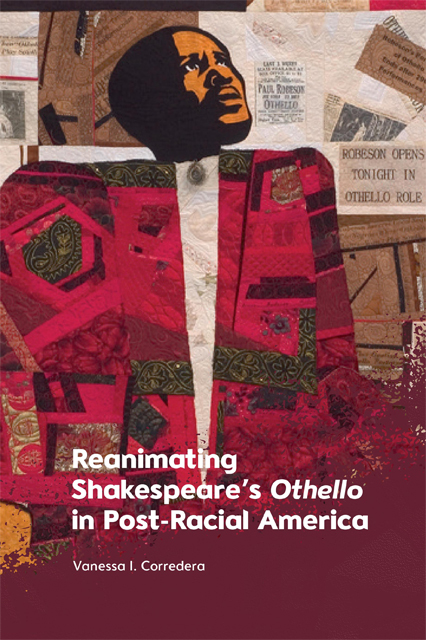Book contents
- Frontmatter
- Contents
- Acknowledgments
- Permissions
- Introduction
- 1 Images of Objectification: Othello as Prop in Kill Shakespeare
- 2 Colorblindness on the Post-Racial Stage: Hip Hop, Comedy, and Cultural Appropriation in Othello: The Remix
- 3 Othello, Race, and Serial: The Ethics of a Shakespearean Cameo
- 4 “No tools with which to hear”: Adaptive Re-Vision, Audience Education, and American Moor
- 5 At the Intersection of Gender, Race, and White Privilege: A Case of Three Desdemona Plays
- 6 Resisting Lobotomized Shakespeare: Whiteness and Universality in Key & Peele and Get Out
- Epilogue
- Bibliography
- Index
Introduction
Published online by Cambridge University Press: 25 October 2023
- Frontmatter
- Contents
- Acknowledgments
- Permissions
- Introduction
- 1 Images of Objectification: Othello as Prop in Kill Shakespeare
- 2 Colorblindness on the Post-Racial Stage: Hip Hop, Comedy, and Cultural Appropriation in Othello: The Remix
- 3 Othello, Race, and Serial: The Ethics of a Shakespearean Cameo
- 4 “No tools with which to hear”: Adaptive Re-Vision, Audience Education, and American Moor
- 5 At the Intersection of Gender, Race, and White Privilege: A Case of Three Desdemona Plays
- 6 Resisting Lobotomized Shakespeare: Whiteness and Universality in Key & Peele and Get Out
- Epilogue
- Bibliography
- Index
Summary
Speak of me as I am
—Othello (V, ii, 352)Reanimating Othello in Post-Racial America
Three panels—that is all artist Mya Lixian Gosling uses to distill the essence of the Shakespearean plays she reimagines through the stickfigure comics on her site Good Tickle Brain. In the Othello threepanel play, originally crafted in 2014, the first panel emphasizes Iago’s deceitfulness, the second stresses how Othello subsequently becomes “insanely” jealous, and the third focuses on the ultimate deaths of Desdemona, Iago, and Othello. In these panels, race in Othello is both present and absent. The stick-figure drawing of Othello depicts his Blackness, for unlike the other characters, Gosling darkly shades his face. Yet any direct discursive reference to Othello’s singular Blackness in an all-white Venice does not make the cut in Gosling’s three panels. As such, his jealousy can be framed as insane rather than legitimately paranoid, stemming, it seems, from a character flaw, with no external nor sympathetic reasoning gestured toward. Perhaps it may seem I expect too much from a three-panel comic intended to offer up each play as having a “beginning, a middle, and an end” so as to introduce people to Shakespeare in an accessible way (Reid 48, 49). Nevertheless, I turn to this three-panel version of Shakespeare’s famous Venetian tragedy because it illustrates what creators deem worthy of emphasis—and, just as importantly, what they do not—when they reinterpret Othello.
Some, such as Gosling, choose not to “see” or emphasize race, thereby leaving a fundamental element of the play unspoken and therefore uncommented upon. Yet other times, race makes surprising yet equally vexed appearances. Take the Sassy Gay Friend (2010) send-up of the play. Comedian and actor Brian Sullivan created the Sassy Gay Friend web series, which consists of short clips that imagine how the titular Sassy Gay Friend (SGF), played by Sullivan, would have intervened in the narrative, thereby creating a different outcome for classic literary tales. Regarding Othello, according to the ninety-second clip, Desdemona would not have died if she’d had a sassy gay best friend. Why? Not only would he have warned her to stop moping in her bed because Othello was coming to murder her over a handkerchief, but just as significantly, he would have disabused her of her compassion for Othello.
- Type
- Chapter
- Information
- Publisher: Edinburgh University PressPrint publication year: 2022



